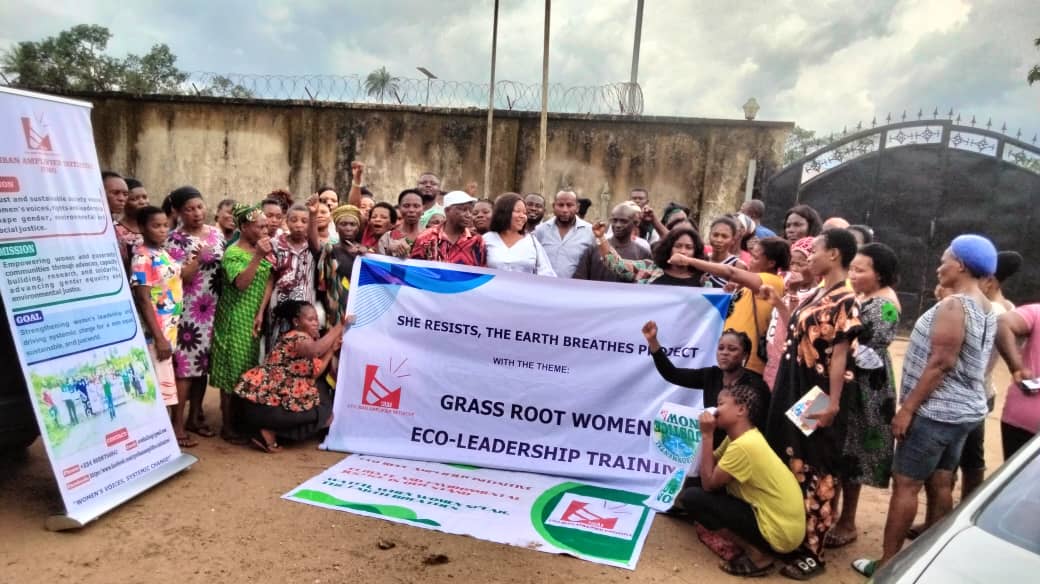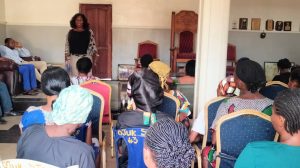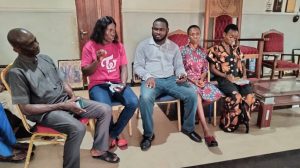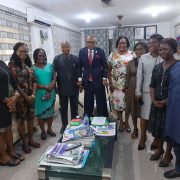Uyo Iban Amplifier Initiative Builds Women’s Capacity to Resist Deforestation in Cross River

By Unyime Okon
A Non-Governmental organisation, Uyo Iban Amplifier Initiative (UIAI) has launched an intensive capacity building engagement to empower women across forest communities in Cross River State to resist deforestation and reclaim their ecological rights.
The training, held at Mfamosing, Akamkpa local government area on Monday under the banner “She Resist – The Earth Breathes Project” brought together women, community leaders, environmental activists, civil society organisations and government representatives to discuss ecofeminism, environmental advocacy, and sustainable livelihoods as tools for defending forest ecosystems.
Speaking during the session on “Understanding Ecofeminism and Women Climate Leadership,” environmental activist Ekemini Simon pointed out the deep connection between women and nature, explaining that when women protect the environment, they are also protecting their own survival and wellbeing.
“When women protect nature, it means they are also protecting themselves. In our forest communities, women are the guardians of life. You grow food, fetch water, gather firewood, and care for the children and elders. You know the forest paths, the healing plants, and the seasons of the rain. When nature is harmed, women are harmed too and when women rise to protect nature, both women and the Earth are healed”, he said.
Simon identified three key challenges women face in environmental and climate issues: loss of access to forest resources, the growing impact of climate change, and lack of inclusion in environmental decision-making processes.
According to him, the destruction of forests by logging companies and outsiders deprives women of herbs, fruits, and firewood needed for their daily sustenance. He noted that climate issues such as irregular rainfall, flooding, and droughts directly affect women’s farms and water sources, worsening their economic vulnerability.
“Most times, decisions about our environment are taken by men or government officials without consulting the women who are most affected,” he added.
Simon, however, outlined practical solutions, calling on women to speak up strategical through storytelling methods, organise, and demand inclusion in local forest and environmental committees where decisions would be taken.
He charged the women to create and promote women’s forest groups so as to amplify their collective voice, adopt sustainable farming and forest use practices, revive traditional ecological wisdom, educate girls and women, and develop eco-friendly income projects such as soap making, honey production, bamboo crafts, and tree nurseries.
Facilitating another session titled “Defending the Earth: Advocacy, Rights and Actions,” a Social Worker in Cross River State, Helen Kanu, noted the importance of strengthening women’s advocacy skills and leadership capacity in environmental defense.
Kanu noted that empowering women to take ownership of environmental advocacy enables them to demand accountability from those exploiting natural resources and to push for inclusive climate policies at local and State levels.
In her remarks, Okoho Ene, the Coordinator of Uyo Iban Amplifier Initiative (UIAI) said the project was designed to build women’s capacity to organise, strengthen leadership and advocacy skills, and enhance ecological care and storytelling using an ecofeminist framework.

She explained that Cross River State, home to Nigeria’s largest remaining rainforest, is an important biodiversity hotspot in West Africa but faces escalating threats from illegal logging, oil palm expansion, mining, and infrastructure development, activities she insisted are often driven by extractive political interests.
The Coordinator added “These actions have displaced indigenous communities, eroded local livelihoods, and triggered severe ecological degradation. Women in these forest areas face multiple burdens; loss of access to land and water, increased unpaid care work, and exclusion from climate adaptation planning.”
Ene said UIAI’s approach, drawing from ecofeminist theory, centres women’s knowledge and resistance as foundational for systemic transformation.
On his part, the Director of Quality Control at the Cross River State Ministry of Environment, Mr. Agba Agbor commended the UIAI for choosing to engage women at the community level. He asked participants to adopt sustainable environmental practices and work collectively to protect their ecosystems.
He said ” In this area, a tree that is over 100 years old can be cut down in less than an hour, but the truth is that the damage lasts generations”.
Agbor warned that since humans are abusing the environment, the consequence is that the earth is not breathing well. He said this is visibly evidence in the vanishing streams across many communities in Cross River State.
He said becoming an eco-defender is important hence the need for the women to get acquainted with environmental laws, organise, and take action.
Echoing the spirit of solidarity that defined the day’s engagement, the Director added “If you want to go fast, move alone. But if you want to go far, move together”.
Agbor assured participants of the state government’s commitment to supporting women in protecting and defending their environment.

From the community level, Glory Lawrence from Abiatti community recounted how deforestation has worsened environmental hazards in her area. According to her, the disappearance of trees that once acted as windbreakers has led to frequent destruction of property by wild winds. She added that women have also lost access to forest herbs, fruits, and the fresh water once sustained by the forest.
Similarly, Immaculata Okon from Mfamosing lamented the exclusion of women from forest conservation decisions, blaming it on patriarchal systems and lack of organisational capacity among women leaders.
“We are not given a voice when it comes to decisions about forest use or conservation projects. The leadership gaps we see are tied to lack of tolerance and limited capacity to organise beyond political boundaries.”
The Highlight of the event was the inauguration of Women Eco Defenders in the two communities of Abiatti and Mfamosing.







